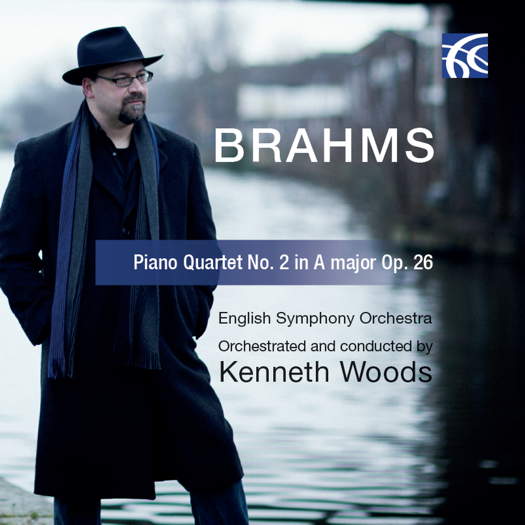 SPONSORED: CD Spotlight. A Very Joyous Disc - Brahms arranged by Kenneth Woods impresses Alice McVeigh.
SPONSORED: CD Spotlight. A Very Joyous Disc - Brahms arranged by Kenneth Woods impresses Alice McVeigh.
All sponsored features >>
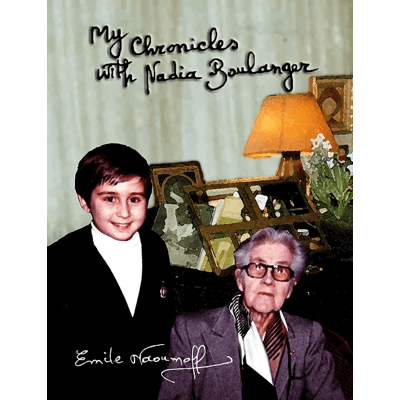 PODCAST: Join Jenna Orkin, Maria Nockin, John Daleiden, Gerald Fenech, Julian Jacobson, Patrick Maxwell, Giuseppe Pennisi and Mike Wheeler for a fascinating fifty-minute audio only programme.
PODCAST: Join Jenna Orkin, Maria Nockin, John Daleiden, Gerald Fenech, Julian Jacobson, Patrick Maxwell, Giuseppe Pennisi and Mike Wheeler for a fascinating fifty-minute audio only programme.
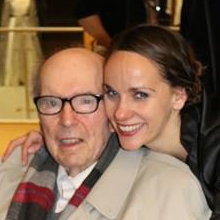 SPONSORED: Ensemble. A view from the pit - John Joubert's Jane Eyre, praised by Alice McVeigh.
SPONSORED: Ensemble. A view from the pit - John Joubert's Jane Eyre, praised by Alice McVeigh.
All sponsored features >>
Joyful Combinations
PATRICK MAXWELL listens to
Britten, McDowall, Horovitz and James Bassi,
performed by Janet Lincé and The New Choir
The use of voices and harp in any performance is mainly a modern phenomenon, one that Benjamin Britten employed to full effect. He popularised it in Ceremony of Carols and his masterful use of the 'queen of instruments' was on full display at the Holywell Music Rooms - Oxford, UK, 29 June 2019 - for a concert of varied musical themes.
The programme on offer certainly made for some sumptuous musical performances, the unique mix of choir, tenor and harp creating a sound in turns joyful and reflective. Each of the pieces, which ranged from Britten to contemporary pieces from Cecilia McDowall and Joseph Horovitz, complemented each other. The soloists were both of consistently excellent quality, which helped to create a concert of evident confidence.
When Gloriana was first performed just six days after the coronation of Queen Elizabeth in 1953, it received such derogatory reviews that Britten left the work to the sidelines of his operatic career, and it has been seldom produced since. The Choral Dances were the only part of the opera that Britten rescued from obscurity, arranging them for tenor solo, harp and chorus. The young vocal soloist Maximilian Lawrie was on fine form throughout the concert, and his mature tone carried the choir sonorously. Under the director of Janet Lincé, the choir grew in quality as the performance went on, having started tentatively during the technically challenging first pieces.
Cecilia McDowall may have a case to being the pre-eminent composer of contemporary British choral music. A Fancy of Folksongs contains an ingenious arrangement describing the lust of a boisterous sailor, set in a jocular fashion. The second of the four pieces, The rambling sailor, was taken by the small force of males voices, and was not as accomplished, which was marginally remedied by the energy of the upper voices. The harpist Jenny Broome was using her immense skill to huge effect, bringing the brilliant writing to life.
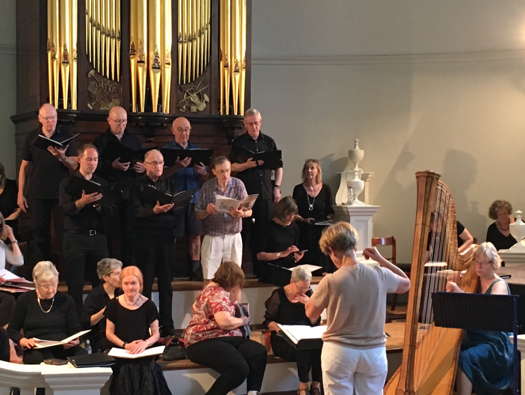
Janet Lincé, Jenny Broome and The New Choir rehearsing at Oxford's Holywell Music Rooms for their 29 June 2019 concert
The interval preceded Three Choral Songs from 'As You Like It' by Joseph Horovitz. These slightly quirky pieces were sung confidently, and the impressive word-painting shone through in the music.
The highlight of the programme was however certainly Britten's 8 Folk Song Arrangements from 1976, which let the two soloists show their technical virtuosity to a new degree. Tenor Lawrie relished his part with masterly technique and control, while Jenny Broome accompanied with elegance. The first, Lord! I married me a wife, was expertly crafted, and the elegiac nature of much of the works was sumptuously performed.
Shakespeare's poetry was used once again as the choir rejoined for James Bassi's Harpsonnets, a work not known to a large audience. The sonnets provided a plentiful store of musical material, particularly evident at the start of Sonnet 18, 'Shall I compare thee to a summer's day?' The four pieces ended in the same frame of mind as they had started, a serene major chord filling the intimate acoustics of the hall.
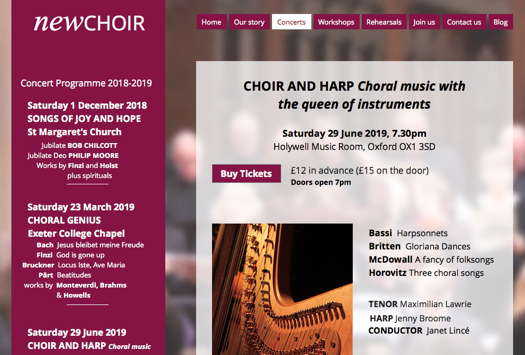
Online publicity for the 29 June 2019 concert
Although the choir singing was at times strained and haphazard, the mix of tenor and harp was a brilliant combination that fitted the well chosen programme of music that the sun-blessed Oxford audience enjoyed. The overall impression was well-crafted, with the effervescent spirit giving a lively series of pieces that were impressively delivered.
Copyright © 3 July 2019
Patrick Maxwell,
Oxford, UK



